Independent public health consultant Kevin Duffy comments on the proposed amendment to decriminalise abortion, and how the British Pregnancy Advisory Service (BPAS) has inadvertently shown how dangerous this amendment is for pregnant mothers
In its campaign to decriminalise abortion, BPAS is using the stories of women who have been prosecuted or investigated to tug at our heartstrings and using emotive language to bring us and our MPs onside with their support for Dame Diana Johnson’s amendment NC1.
However, when we look more closely at these cases, we find that it is possible to empathise with and support these vulnerable women by calling for changes other than removing women from the confines of the abortion laws. In this debate, we need to lead with objective reasoning and leave to one side our heartfelt emotions.
The details for a few of these stories are quite vague, nothing much more than that used in the BPAS TimeToAct poster campaign. Others have been covered more fully in mainstream media, and in one case we can read the details in papers published by the courts.
There are two groups of women and our response should be shaped around the differences in these. The first are those women who have pled guilty or been found guilty of performing their own illegal abortion and the second are women who have suffered from a natural stillbirth and for some reason have subsequently been investigated by the police under suspicion of having induced the stillbirth.
Women performing their own illegal abortions
Laura, Jessica and Lena needed emergency treatment at a local hospital due to complications arising from their DIY medical abortion.
It is noteworthy that BPAS has not used Carla Foster’s story in its poster campaign. Whilst it is possible that Jessica and Lena used pills-by-post, we know for certain that Carla did; she deliberately exploited the systemic flaw in telemedicine abortion by lying to the provider about the dates of her pregnancy; she gave BPAS a date for her last menstrual period that indicated she was below the legal limit of 9-weeks-6-days gestation, and they sent her the abortion pills-by-post.
Laura, Lena and Carla’s cases came to attention of the authorities when, because of the complications arising from their DIY abortions, they each called for an ambulance.
In-person medical consultations ensure an accurate assessment of gestational age, thus overcoming the systemic flaw in telemedicine abortion, namely that sometimes women think they are earlier in their pregnancy than they really are, as did Laura, Jessica and Lena, and sometimes they deliberately mislead providers about this, as did Carla.
We should call for a return to in-person medical consultations before an NHS provider can prescribe the abortion pills, rescinding the telemedicine pills-by-post process. It is true that that women might still procure the abortion pills illegally online, but at least then an NHS contracted provider would not have been duped into participation in this breach of abortion laws and regulations.
Laura’s case reminds us of the need to help protect women from reproductive coercion; this is another good reason for mandating a return to in-person consultations, where women, in a safe and confidential setting, might be able to disclose what is happening to them at home.
It is hard to see how abortion decriminalisation would in itself help women like Laura; instead we need to encourage the police and the Crown Prosecution Service to ensure that all frontline team members are trained and equipped to respond better to matters of domestic abuse, and coercive and controlling behaviours.
In the five years 2018 to 2022, six women have been charged and brought to court for breaking the abortion laws; given that in the same period more than four million women were pregnant, these six represent just 0.00015%.[1] Prosecution cases are extremely rare and the threat of a criminal conviction is fair and proper. We don’t need to decriminalise abortion. Women who perform their own abortions outside the law should be prosecuted and convicted, but perhaps not always given a custodial sentence.
Women investigated after a stillbirth
Zara’s case is front and centre of the abortion decriminalisation campaign – a vulnerable teenager who suffered a stillbirth and then faced the trauma of a police investigation that only ended when, one year later, the coroner concluded that her baby had died of natural causes.
The call to remove women from the threat of investigation under the current abortion laws is understandable when you read about Zara’s case, but we need to also consider why the police might investigate and whether we need any change to the threshold for that.
A spokesperson for the National Police Chiefs’ Council, told The Times in December 2023, “unexpected pregnancy loss is not something which is routinely investigated by police as potential illegal abortion. An investigation would only be initiated where there is credible information to suggest criminal activity, and this would often be as a result of concerns raised from medical professionals. It would be at the discretion of the senior investigating officer leading the case to determine which reasonable lines of inquiry to follow, which may include toxicology or digital data.”[2]
It is perhaps understandable why the police investigated these women: Zahra, Ciara, Lauren and Fay had each been with an abortion provider just weeks before their unexplained stillbirths.
In 2021, across England and Wales, there were a total of 2,597 stillbirths.[3] It is clear that police investigations are rare. The four cases cited by BPAS represent just 0.15% of all stillbirths in one year, and we don’t know if these four spanned more than one year.
Yes, cases such as Zara’s are tragic and heartbreaking, but that in itself is not sufficient cause for abortion decriminalisation; rather it suggests that what is needed is a review of the police thresholds for investigation and the subsequent processes followed, and consideration of whether investigations might be resolved much more quickly.
Who are the women on the BPAS posters?
Laura*
In August 2022, The Times published a story about Laura*[4] who had been imprisoned for two years after being found guilty of an illegal abortion at 30 weeks.[5] [6] At the time of publishing, Laura had served her two years and after her release, she had finished her university studies and graduated.
Laura was 20, a mother of a two-year-old daughter, studying at university and living in an abusive relationship, when she discovered she was pregnant. Somewhat fearfully, she told her boyfriend and he insisted that she had an abortion but would not allow her to attend her doctor’s clinic; instead he told her to get abortion pills online.
Laura believed that she was less than ten weeks pregnant when she self-administered the pills in her bathtub at home. She describes the absolute horror that followed: “I almost died. I remember the bath being filled with at least an inch of blood.” She called for an ambulance and was subsequently told by the hospital team that she had given birth to a 30-week-old fetus, who was stillborn. Laura disclosed that she had used abortion pills and the police were called to her bedside.
Laura’s story reveals the dangers women face when using abortion pills at these later gestations; excessive bleeding is common and very often women need emergency medical attention for the complications arising. It is because of the increasing risk of complications that the World Health Organisation and the Royal College of Obstetricians and Gynaecologists consider self-managed medical abortion to be unsafe from 12 weeks gestational age.[7] It is because of these complications that women, like Laura, end up in hospital, where sometimes suspicions are raised leading to a subsequent police investigation.[8]
Her story lays bare the reproductive coercion faced by many women. It is surely a significant failure of her care team, of the police investigators, and of the courts that nobody uncovered the truth of Laura’s abusive boyfriend. In the article by The Times, Labour MP Jess Phillips calls out this failure saying: “The story would be a different one had just somebody with training spoken to her at any point – somebody who was advocating on her behalf and who understood abuse control, coercion, women’s reproductive.”
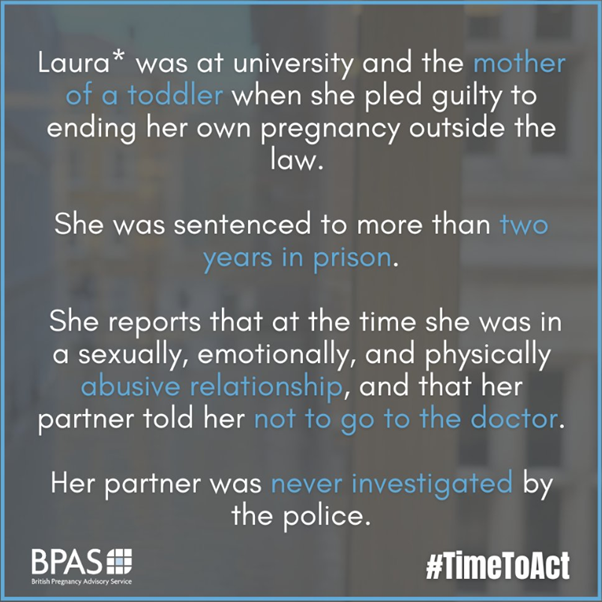
Jessica*
BPAS is using the pseudonym ‘Jessica’ for a woman whose story is public and who can be identified from the details provided.
In January 2024, because of ‘evidential difficulties’, the prosecution case against Jessica was withdrawn just before the start of further court proceedings. She had been accused of using abortion pills to commit an illegal abortion in July 2020, and after three years of police investigation she pleaded not guilty at a court hearing in June 2023.[9]
Jessica was 19 years old when she had a stillbirth in July 2020, just days after the first Covid-19 lockdown.
On its campaign poster, BPAS says Jessica was 19 when she used abortion pills and gave birth at home; when Jessica was interviewed by the police, she told them she had believed she was early in her pregnancy.[10]
It is possible that Jessica obtained the abortion pills using the telemedicine pills-by-post process which had just been introduced at the end of March 2020. It is very likely that had Jessica attended an in-person medical consultation, the true gestational age of her pregnancy would have been determined and she might not have suffered the subsequent traumas of the stillbirth at home and three years of police investigation and court proceedings.
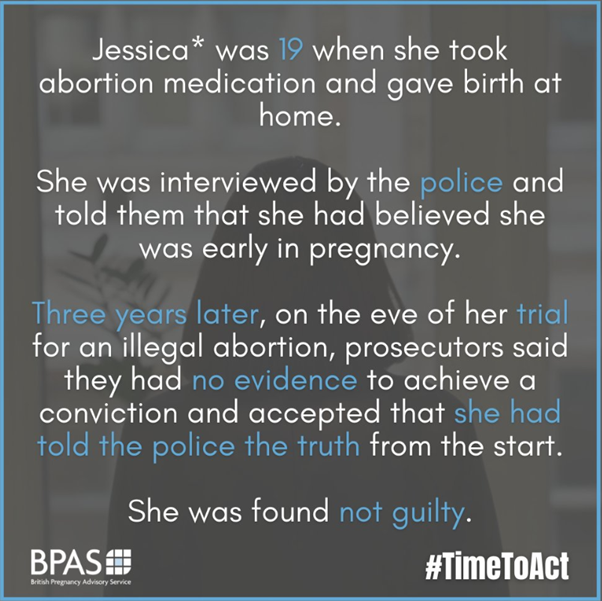
Zahra*
Dr Lord, medical director at MSI Reproductive Choices, and Stella Creasy MP use Zahra’s story under a different pseudonym, Megan*.
In 2021, Zahra*, then 15 years old, was investigated by the police on suspicion of having committed an illegal abortion. She had previously attended an abortion clinic but the providers were unable to proceed because, by then, she was more than 24 weeks pregnant. A few weeks later, in a local hospital, Zahra suffered an unexplained stillbirth at 28 weeks. Staff became aware that she had previously attended an abortion clinic and called the police. The investigation lasted for more than one year, causing Zahra significant emotional distress. The case was dropped after the coroner concluded that her baby had died from natural causes.
When you read Zahra’s story, it is very easy to understand why hers is central to the campaign for abortion decriminalisation. Whilst she was not guilty of having committed an illegal abortion, she was being investigated under suspicion of having broken the abortion laws. Campaigners argue that if women are removed from these laws, then no woman could be investigated when suspected of seeking to end her own pregnancy, and none would suffer the, undoubted, stress and trauma of such an investigation after the heartbreak of a natural miscarriage or stillbirth.
Her story raises the question of whether healthcare workers should report their patients to the police – I have written about this before and lean towards maintaining patient confidentiality.[11] Other questions that should be asked are whether any safeguarding concerns were raised given her pregnancy at 15 years old, whether she might have had better care when evidently self-harming, and why it took as long as one year for the coroner’s report to be published.
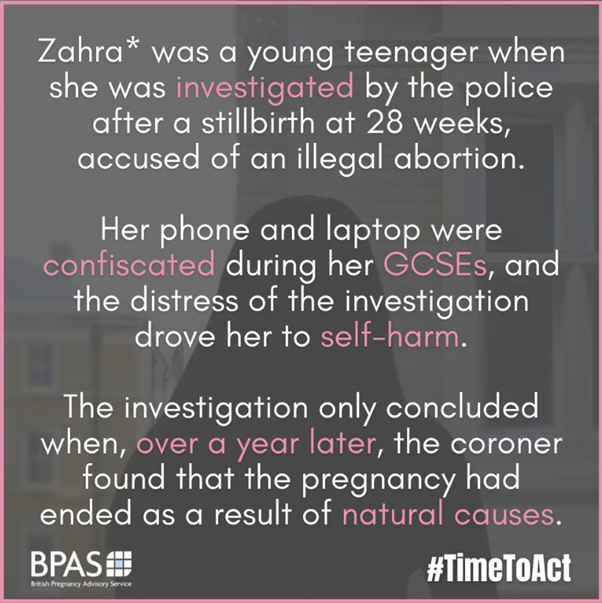
Ciara*
Ciara* was assessed as unsuitable for an abortion at a standalone abortion facility and that abortion provider subsequently failed to make a successful referral to an NHS facility before she reached the 24-week gestational age limit. Some weeks later, Ciara had an unexpected stillbirth and when she reported this, a police investigation was launched.
Lauren*
Lauren*, then 17 years old, presented to an abortion provider in 2020/21 and was assessed to be more than 24 weeks pregnant, so she was referred to children’s services and antenatal care. Soon after, she delivered a stillborn baby at home, and was subsequently investigated by the police.
Lauren’s case was cited by RCOG et al in their written evidence to the Criminal Justice Bill committee.[12]
Fay*
Fay*, a woman in her early forties, contacted MSI Reproductive Choices in 2021 seeking an abortion. The details after that are somewhat vague, Dr Lord, medical director of MSI-RC, told The Independent that Fay unexpectedly delivered, at home, a stillborn baby that was about 24 weeks old. He denied that Fay had flouted the abortion time limits but did not explain whether the stillbirth had been induced by Fay or was of natural causes. He said: “She was shocked to give birth due to not knowing how far along pregnant she was.” He added that he had access to the birth weight and measurements of the stillborn child and was confident it was under 24 weeks.[13]
The BPAS poster suggests that Fay’s stillbirth was the result of abortion care sought within the formal healthcare system.
So, either Fay was being legally treated at an MSI-RC facility but she was discharged before her abortion was complete (very unlikely) or she used abortion pills, perhaps obtained from MSI-RC, to induce her abortion whilst thinking that she was less than 10 weeks pregnant (more likely).
In any case, Fay’s abortion treatment led to the stillbirth of her baby at 24 weeks and she was subsequently admitted to hospital for a surgical procedure due to complications arising from that stillbirth.
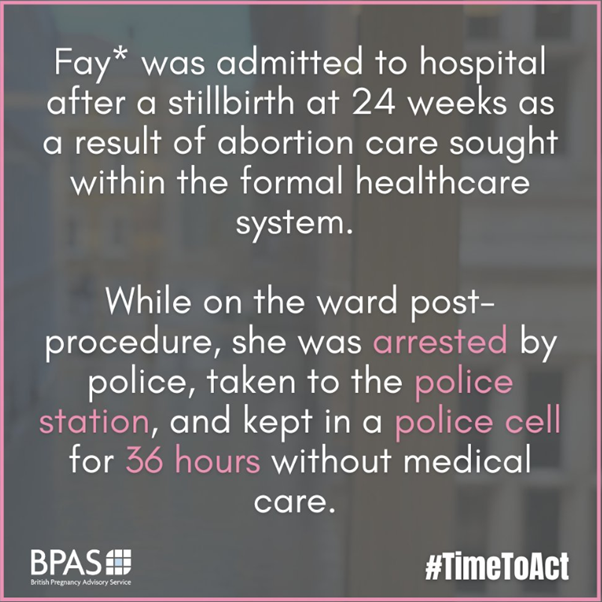
Lena*
We know from the BPAS poster that Lena* needed hospital treatment for complications arising from an early medical abortion (EMA is typically when the gestational age is less than ten weeks). Lena’s case was cited by RCOG et al in their written evidence to the Criminal Justice Bill committee. In this they state Lena “was taken to hospital by ambulance owing to complications from early medical abortion medication that she was given after a medical consultation this year. She believed she was ten weeks pregnant, but it emerged she was actually at 19 weeks.”
Lena’s case reveals the critical weakness of telemedicine abortion, it is simply not possible for an abortion provider to be certain of the gestational age when relying solely on a telephone consultation.
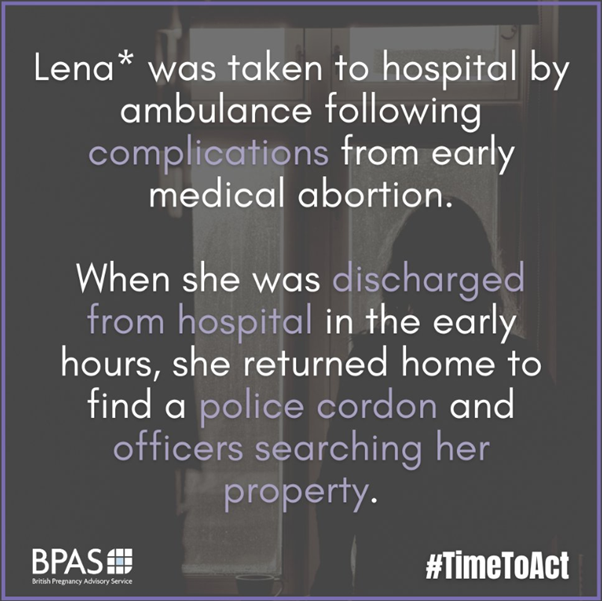
In conclusion
Women need to be told about the real risk of abortion complications, that as many as 1-in-17 who use the abortion pills at less than 10 weeks gestational age will subsequently need medical attention at a hospital, and that this risk increases steeply as GA progresses.[14]
References
[1] Duffy K. Johnson’s Six represent 0.00015%. Percuity. Published February 25, 2024. https://percuity.blog/2024/02/25/johnsons-six-represent-0-00015/
[2] Gibbons K. 100 women and girls investigated over ‘illegal abortions.’ The Times. https://www.thetimes.co.uk/article/100-women-and-girls-investigated-over-illegal-abortions-h6njmgwnf. Published December 11, 2023.
[3] Births in England and Wales – Office for National Statistics. Published February 23, 2024. https://shorturl.at/iox04
[4] Names with an asterisk, e.g., Laura*, are pseudonyms used by abortion campaigners, mainstream media, and some authorities when referring to a particular case.
[5] Al-Othman H. Laura’s story: jailed for having an abortion in Britain. The Sunday Times. https://www.thetimes.co.uk/article/lauras-story-jailed-for-having-an-abortion-in-britain-0m06nzrlx. Published August 6, 2022.
[6] Thornton L. UK woman jailed for taking abortion pills when abusive partner got her pregnant. The Mirror. Published August 7, 2022. https://www.mirror.co.uk/news/uk-news/student-jailed-two-years-uk-27680027
[7] Duffy K. Criminal Justice Bill Committee – written evidence. Percuity. Published February 26, 2024. https://percuity.blog/2024/01/26/cjb-committee-written-evidence/
[8] Duffy K. Johnson’s Six represent 0.00015%. Percuity. Published February 25, 2024. https://percuity.blog/2024/02/25/johnsons-six-represent-0-00015/
[9] Brown M. Teesside woman cleared over lockdown abortion charges after CPS offers no evidence. The Guardian. https://www.theguardian.com/uk-news/2024/jan/09/teeside-woman-cleared-over-lockdown-abortion-charges-after-cps-offers-no-evidence. Published January 10, 2024.
[10] BPAS on X; tweet at 7pm on 22 February 2024, Jessica’s* story: https://x.com/BPAS1968/status/1760741286829510675?s=20
[11] Duffy K. Compassion not judgement. Percuity. Published February 24, 2024. https://percuity.blog/2024/01/28/compassion-not-judgement/
[12] CJB24. Criminal Justice Bill publications – Parliamentary Bills – UK Parliament. https://bills.parliament.uk/bills/3511/publications
[13] Oppenheim M. Woman kept in police cell for 36 hours after stillbirth due to suspicions she had illegal abortion. The Independent. https://www.independent.co.uk/news/uk/home-news/woman-police-custody-stillborn-birth-b2111991.html. Published July 05, 2022.
[14] Duffy K. At least 39,000 women treated for DIY abortion complications in five years. Christian Concern. Published December 20, 2023. https://christianconcern.com/comment/at-least-39000-women-treated-for-diy-abortion-complications-in-five-years/
Find out more about DIY abortions




